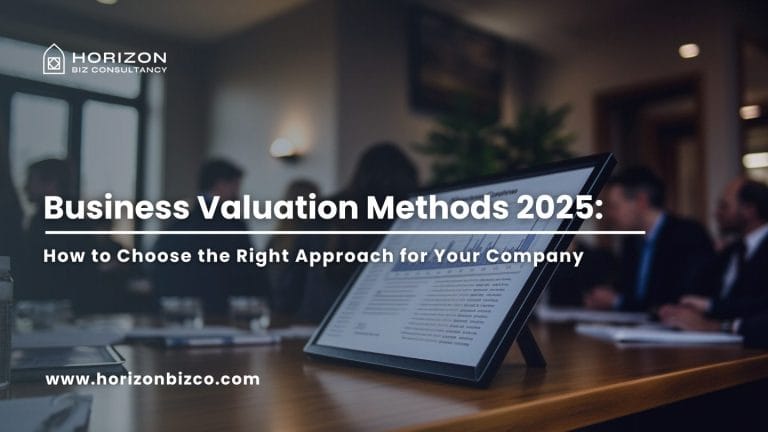Introduction
Are you planning to sell your business, raise capital, or attract investors in 2025? One of the most critical steps is getting your business valuation right. But with constantly evolving markets and a flood of valuation techniques, founders and owners often feel lost. This blog explains the most practical valuation methods in 2025, guides you in selecting the right one, and shows why an expert touch delivers the most reliable results, so you can maximize your business’s worth and unlock growth today.
Why Business Valuation Matters More Than Ever
- Global M&A activity is expected to surpass $2 trillion in deals this year.
- 67% of business owners plan to exit within the next decade, but the average gap between owner expectation and actual sale price is an eye-popping 40%.
A professional, well-chosen valuation can bridge that gap, helping you make better strategic decisions, attract the right buyers or investors, and avoid leaving money on the table.
The Three Main Approaches to Business Valuation
1. Income-Based Approaches
Discounted Cash Flow (DCF) Analysis: Forecasts your company’s future cash flow, factoring in working capital requirements and capital expenditure (Capex) based on the business’s capital intensity and growth plans, and discounts it to present value. DCF not only provides financial clarity and a sense of understanding of the business, management growth plan, and Capex requirements. This method is ideal for businesses with predictable growth and long-term plans.
Capitalization of Earnings & Income Multiplier: These methods use your company’s earnings, divided by a capitalisation rate or multiplied by an industry multiple, to estimate value. Best for businesses with steady and recurring revenue.
Dividend Discount Model (DDM): For companies that pay regular dividends, mainly mature, profitable businesses.
2. Market-Based Approaches
Comparable Company Analysis (CCA)/Market Comps: Your value is set by comparing your business to similar ones sold or valued recently. This is particularly useful in industries with plenty of public comparables and provides a reality-check grounded in deals the market is already making.
Revenue and Earnings Multiples: Quick, industry-standard methods that multiply your annual revenue or profit by typical multiples for your sector. This is one of the widely used techniques for valuation. For example, SaaS companies in 2025 trade at 5–15x revenue, while manufacturing businesses might go for 1–3x.
3. Asset-Based Approaches
Adds up the market value of your assets and subtracts liabilities. Suited for businesses with substantial physical or tangible assets (manufacturing, real estate, etc.). Simple, but can miss the value of brands, IP, and other intangibles.
Which Method Is Right for You?
Choosing the best method depends on:
- Your sector and business model
- Stage and size (startup, growth, or exit-ready)
- Profitability and revenue predictability
- The purpose of your valuation (sale, funding, planning, dispute, etc.)
Pro Tip: Most professionals use at least two methods and reconcile them.
| Method | Best For | Limitations |
| DCF | Growth businesses with strong forecasting | Needs reliable forecasts, more complex |
| Earnings Multiples | Established, profitable companies | Not apt for unprofitable/newer businesses |
| Revenue Multiples | High-growth/startups with less profit history | Misses profitability, very market-driven |
| Asset-Based | Asset-rich businesses, liquidation scenarios | Ignores intangibles, undervalues growth |
| Market Comps | Any, if public comps available | Valuation is only as good as comparables |
A Few 2025 Market Multiple Metrics:
- A tech SaaS startup with $1M annual revenue, trading at 8x multiples → $8M valuation.
- An established manufacturing firm with $200K profit, P/E multiple at 12 → $2.4M valuation.
- A retail operation using asset-based valuation might receive a lower value than by the earnings method because it underestimates customer loyalty and brand value.
Why Hire a Professional Valuation Expert?
- Objectivity and credibility for buyers/investors
- Use of advanced techniques (hybrid, scenario, sector adjustments) and sensitivity analysis of key metrics to gain a clearer understanding of value, enabling better-informed decisions
- Expertise in documentation and regulatory compliance (especially for audits, legal disputes, or international expansion)
- A good firm can help you uncover hidden value, boosting not just a number, but your entire strategic position.
How Horizon Biz Consultancy Can Help
At Horizon Biz Consultancy, we blend deep industry expertise with the most current, reliable valuation methods. From DCF and market comps (or a mix based on business model, stage, and appropriateness) to customized approaches for your unique business, we help you:
- Understand what drives your true value
- Benchmark against peers
- Plan for growth, exit, or funding with confidence
Ready to discover your business’s TRUE worth or need tailored advice for an upcoming deal? Let’s talk.
Unlock your business’s true value in 2025. Contact us today for an expert-led, actionable valuation.
FAQ’s
The primary methods include Discounted Cash Flow (DCF), Market Comparables, Earnings Multiples, and Asset-Based approaches, each suited for different business models and goals.
Choosing depends on your industry, business size, revenue predictability, and whether the valuation is for sale, funding, or strategic planning. Often, a combination of methods is used for more appropriateness.
Professional valuations provide credibility, uncover hidden intangible assets, and use advanced techniques that reflect current market dynamics, ensuring you get an accurate and defensible value.
Multiples vary by industry, such as technology firms trading at higher revenue multiples compared to manufacturing, and these benchmarks impact the estimated value significantly.
Yes. In 2025, intangibles, including brand reputation, intellectual property, and ESG (Environmental, Social, Governance) criteria increasingly affect valuations and investor interest.





